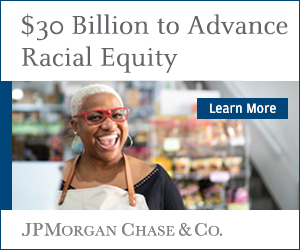By Aaron Allen, The Seattle Medium
Are you interested in starting a business or enhancing a business you already own? Not sure how to go about it, what it takes? During Black Business Month, JP Morgan Chase is emphasizing their commitment to help provide start-up and existing businesses with the resources that they need to succeed.
Small businesses have the power to boost job creation, community development and local economies. But critical to their success is equipping small business owners with the tools, knowledge and capital necessary to start companies and develop existing ones. With that in mind, Chase has allocated $2 billion in capital for Black and Latinx businesses, and is making a conscious effort to do a better job educating businesses on what it takes to overcome obstacles that have historically hindered Black business growth, sustainability and success.
“For start-ups all the way up to businesses going public we would love to be there for a business’s long journey,” says Edward R. Gay, Vice President of Commercial Banking in Chase’s Middle Market Banking team. “I have worked with small businesses for 14 years because I like learning about businesses, where they’re going, how they’re made and you don’t get close to their stories without working with small businesses.”
While the COVID-19 pandemic has taken a disproportionate toll on Black-owned businesses, it has also driven many companies and industries to launch much-needed racial equity initiatives to support the long-term recovery and economic growth of historically underserved communities, and to provide access to new and innovative opportunities.
For business owners like Jeffrey Taylor, who owns a local insurance agency, in many ways the pandemic has been a blessing in disguise.
“Covid opened up new opportunities for new businesses and was probably one of the biggest things to happen for new and existing entrepreneurs and businesses [in recent years],” says Taylor. “[It forced business owners to find] new ways to meet the needs of the people, and to stay in business.”
Gay agrees and says that with so many people looking to change careers and go into business for themselves as a result of COVID, access to resources, knowledge and professionals in industries that support businesses like banking are needed now more than ever.
“What we are doing at this time is wanting to do a better job at focusing at what hurdles there are for startup businesses, especially startup businesses by Black people and people of color,” says Gay.
“One of the hurdles is knowledge, knowing what your hurdles may be as a startup,” says Gay. “The biggest and most obvious one is capital, but it is not always what I call seed money, it is not always startup money. You can have a business and you have seed money, but you can also reach what is called a “choke point”, this is where the business has reached its capacity but needs help to go beyond that, so to do that they need more capital.”
According to Gay, one of the challenges when businesses reach a “choke point” is identifying the best solutions and finding the necessary capital to execute it.
“They [business owners] can look for investors from friends or family or private equity, credit, lines of credits but the key is knowledge of those choke points and how to address them before it can really stall or hurt a business,” says Gay.
When it comes to the sustainability and growth of a small business, there are some fundamental building blocks that can make the difference between keeping a business afloat and running a business that is growing and flourishing, even in challenging environments. These building blocks include:
• Having a reliable network: Having a mentor or access to someone who’s done this before has been valuable for potential clients. Whether they’re asking questions, discussing ideas, or just offering general support, there are incredible champions right here in the local community. You can supplement a local strong support network with Chase workshops, panel discussions and summits. You can also join the Chase for Business mailing list and social channels where you’ll find regular updates on networking and learning opportunities that are available. The Chase for Business offerings are great for both growing your knowledge of managing a business, as well as growing your network beyond your community.
• Having a relationship with your banker: Banking is about relationships. Chase encourages and welcomes everyone to stop by their branches or set up a digital appointment to begin cultivating a banking relationship, where they actively ask local entrepreneurs about their experiences and pain points, including questions like “What are your greatest barriers to financial success?” and “How can we help you overcome them?” The more your banker knows about where you are struggling, the better equipped they are to help you find a solution.
• Knowledge of operational tools: From digital payment systems to automated billing, there are countless tech-based software and service offerings available to simplify many aspects of managing a business. Digital media and marketing tools have also been game-changers for many business owners as they look to reach and engage more customers.
• Access to funding and loans: Starting a business costs money! Initial expenses can include everything from licenses to new equipment. Luckily, there are alternatives to covering these costs entirely on your own, like loans, grants, lines of credit and other capital set aside specifically for Black entrepreneurs.
Business ownership is not an easy pathway but it can be a rewarding one and Chase wants to let the business community, particularly Black business owners, that they are here to support them at every step along the way.
“Chase is a place for someone who owns a business, or wants to start a business,” says Gay. “If someone wants to start a business, start from scratch we are there for them. [For] individuals who work with Chase like your startups, borderline hobbies, all they way up to fortune 100 companies, we have specialist and advisors who represent Chase, we will have a conversation with you.”
“We value the relationship with the Black community in Seattle, with businesses in Seattle, we value them as community partners more than we value them as customers,” continued Gay. “I just want everyone to know that our intentions are very real and we want to be advisors to someone who wants to be a business owner whether its imminent or still an idea, we welcome that conversation.”
From one business owner to the enterprising, Taylor leaves this message with regards to your personal endeavors towards owning a business.
“Capitalization is important,” says Taylor. “My term is it takes dough to make bread and you have to have access either through your own personal savings or through the ability of obtaining credit to be able to take risks. Because most of what you do in business is not guaranteed, so you have to have money to be prepared to fail as well as money to help you succeed.”
























